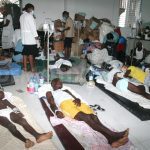The United Nations Office for the Coordination of Humanitarian Affairs (UNOCHA) has issued a warning about the ongoing cholera outbreak in southeastern Ethiopia.
According to the UNOCHA’s latest situation update, given late Thursday, the cholera outbreak is the longest in history and is continuing unabatedly, with a significant danger of disease cross-border dissemination. It also stated that the floods have aggravated health hazards such as cholera in the afflicted areas of the East African country.
It said some 41 cholera treatment centers and units across affected areas are operational, and an estimated 35,850 people have received clean drinking water as of the beginning of May.
Figures from the UNOCHA show that some 100,000 people were previously vaccinated, while a new round of oral cholera vaccination campaign with 1.9 million doses available as of early April is scheduled for rollout in mid-May.
However, it claims that the campaign’s coverage is inadequate, given that more than 7 million people live in or around the affected areas.
More funding are needed to increase oral cholera vaccination coverage, according to the report, which adds that targeted investments, particularly in clean drinking water supply systems, sanitation, and hygiene, can reduce the risk of cholera, even in vulnerable communities affected by insecurity and displacement.
The United Nations Office for the Coordination of Humanitarian Affairs (UNOCHA) has issued a warning about the ongoing cholera outbreak in southeastern Ethiopia.
According to the UNOCHA’s latest situation update, given late Thursday, the cholera outbreak is the longest in history and is continuing unabatedly, with a significant danger of disease cross-border dissemination. It also stated that the floods have aggravated health hazards such as cholera in the afflicted areas of the East African country.
It said some 41 cholera treatment centers and units across affected areas are operational, and an estimated 35,850 people have received clean drinking water as of the beginning of May.
Figures from the UNOCHA show that some 100,000 people were previously vaccinated, while a new round of oral cholera vaccination campaign with 1.9 million doses available as of early April is scheduled for rollout in mid-May.
However, it claims that the campaign’s coverage is inadequate, given that more than 7 million people live in or around the affected areas.
More funding are needed to increase oral cholera vaccination coverage, according to the report, which adds that targeted investments, particularly in clean drinking water supply systems, sanitation, and hygiene, can reduce the risk of cholera, even in vulnerable communities affected by insecurity and displacement.
The United Nations Office for the Coordination of Humanitarian Affairs (UNOCHA) has issued a warning about the ongoing cholera outbreak in southeastern Ethiopia.
According to the UNOCHA’s latest situation update, given late Thursday, the cholera outbreak is the longest in history and is continuing unabatedly, with a significant danger of disease cross-border dissemination. It also stated that the floods have aggravated health hazards such as cholera in the afflicted areas of the East African country.
It said some 41 cholera treatment centers and units across affected areas are operational, and an estimated 35,850 people have received clean drinking water as of the beginning of May.
Figures from the UNOCHA show that some 100,000 people were previously vaccinated, while a new round of oral cholera vaccination campaign with 1.9 million doses available as of early April is scheduled for rollout in mid-May.
However, it claims that the campaign’s coverage is inadequate, given that more than 7 million people live in or around the affected areas.
More funding are needed to increase oral cholera vaccination coverage, according to the report, which adds that targeted investments, particularly in clean drinking water supply systems, sanitation, and hygiene, can reduce the risk of cholera, even in vulnerable communities affected by insecurity and displacement.
The United Nations Office for the Coordination of Humanitarian Affairs (UNOCHA) has issued a warning about the ongoing cholera outbreak in southeastern Ethiopia.
According to the UNOCHA’s latest situation update, given late Thursday, the cholera outbreak is the longest in history and is continuing unabatedly, with a significant danger of disease cross-border dissemination. It also stated that the floods have aggravated health hazards such as cholera in the afflicted areas of the East African country.
It said some 41 cholera treatment centers and units across affected areas are operational, and an estimated 35,850 people have received clean drinking water as of the beginning of May.
Figures from the UNOCHA show that some 100,000 people were previously vaccinated, while a new round of oral cholera vaccination campaign with 1.9 million doses available as of early April is scheduled for rollout in mid-May.
However, it claims that the campaign’s coverage is inadequate, given that more than 7 million people live in or around the affected areas.
More funding are needed to increase oral cholera vaccination coverage, according to the report, which adds that targeted investments, particularly in clean drinking water supply systems, sanitation, and hygiene, can reduce the risk of cholera, even in vulnerable communities affected by insecurity and displacement.
The United Nations Office for the Coordination of Humanitarian Affairs (UNOCHA) has issued a warning about the ongoing cholera outbreak in southeastern Ethiopia.
According to the UNOCHA’s latest situation update, given late Thursday, the cholera outbreak is the longest in history and is continuing unabatedly, with a significant danger of disease cross-border dissemination. It also stated that the floods have aggravated health hazards such as cholera in the afflicted areas of the East African country.
It said some 41 cholera treatment centers and units across affected areas are operational, and an estimated 35,850 people have received clean drinking water as of the beginning of May.
Figures from the UNOCHA show that some 100,000 people were previously vaccinated, while a new round of oral cholera vaccination campaign with 1.9 million doses available as of early April is scheduled for rollout in mid-May.
However, it claims that the campaign’s coverage is inadequate, given that more than 7 million people live in or around the affected areas.
More funding are needed to increase oral cholera vaccination coverage, according to the report, which adds that targeted investments, particularly in clean drinking water supply systems, sanitation, and hygiene, can reduce the risk of cholera, even in vulnerable communities affected by insecurity and displacement.
The United Nations Office for the Coordination of Humanitarian Affairs (UNOCHA) has issued a warning about the ongoing cholera outbreak in southeastern Ethiopia.
According to the UNOCHA’s latest situation update, given late Thursday, the cholera outbreak is the longest in history and is continuing unabatedly, with a significant danger of disease cross-border dissemination. It also stated that the floods have aggravated health hazards such as cholera in the afflicted areas of the East African country.
It said some 41 cholera treatment centers and units across affected areas are operational, and an estimated 35,850 people have received clean drinking water as of the beginning of May.
Figures from the UNOCHA show that some 100,000 people were previously vaccinated, while a new round of oral cholera vaccination campaign with 1.9 million doses available as of early April is scheduled for rollout in mid-May.
However, it claims that the campaign’s coverage is inadequate, given that more than 7 million people live in or around the affected areas.
More funding are needed to increase oral cholera vaccination coverage, according to the report, which adds that targeted investments, particularly in clean drinking water supply systems, sanitation, and hygiene, can reduce the risk of cholera, even in vulnerable communities affected by insecurity and displacement.
The United Nations Office for the Coordination of Humanitarian Affairs (UNOCHA) has issued a warning about the ongoing cholera outbreak in southeastern Ethiopia.
According to the UNOCHA’s latest situation update, given late Thursday, the cholera outbreak is the longest in history and is continuing unabatedly, with a significant danger of disease cross-border dissemination. It also stated that the floods have aggravated health hazards such as cholera in the afflicted areas of the East African country.
It said some 41 cholera treatment centers and units across affected areas are operational, and an estimated 35,850 people have received clean drinking water as of the beginning of May.
Figures from the UNOCHA show that some 100,000 people were previously vaccinated, while a new round of oral cholera vaccination campaign with 1.9 million doses available as of early April is scheduled for rollout in mid-May.
However, it claims that the campaign’s coverage is inadequate, given that more than 7 million people live in or around the affected areas.
More funding are needed to increase oral cholera vaccination coverage, according to the report, which adds that targeted investments, particularly in clean drinking water supply systems, sanitation, and hygiene, can reduce the risk of cholera, even in vulnerable communities affected by insecurity and displacement.
The United Nations Office for the Coordination of Humanitarian Affairs (UNOCHA) has issued a warning about the ongoing cholera outbreak in southeastern Ethiopia.
According to the UNOCHA’s latest situation update, given late Thursday, the cholera outbreak is the longest in history and is continuing unabatedly, with a significant danger of disease cross-border dissemination. It also stated that the floods have aggravated health hazards such as cholera in the afflicted areas of the East African country.
It said some 41 cholera treatment centers and units across affected areas are operational, and an estimated 35,850 people have received clean drinking water as of the beginning of May.
Figures from the UNOCHA show that some 100,000 people were previously vaccinated, while a new round of oral cholera vaccination campaign with 1.9 million doses available as of early April is scheduled for rollout in mid-May.
However, it claims that the campaign’s coverage is inadequate, given that more than 7 million people live in or around the affected areas.
More funding are needed to increase oral cholera vaccination coverage, according to the report, which adds that targeted investments, particularly in clean drinking water supply systems, sanitation, and hygiene, can reduce the risk of cholera, even in vulnerable communities affected by insecurity and displacement.














